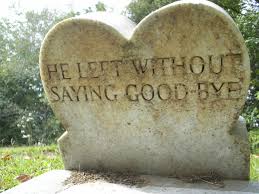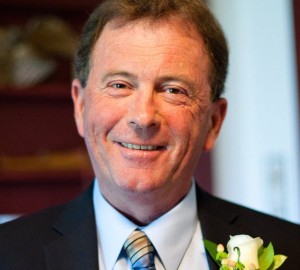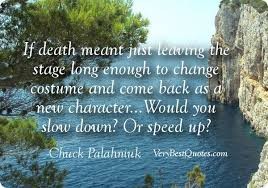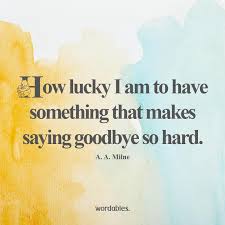
It was only a week ago.
Last Tuesday, my last night in Ohio, I was sitting around the table after dinner, chatting with my daughter-in-law, Jenna. She’s been a nurse practitioner in family practice for a few years and had lost two of her patients recently. She hadn’t seen it coming; their medical concerns were under control and they had been doing well. The experience had shaken her.
It was a good conversation, as those from the heart usually are.
Singing as I do in a hospice choir, I had many stories to share about the unexpectedness, the fickleness of death. The one I chose was the story of the parents of one of the basses in our choir, Continua. His ailing mother had been moved into the local nursing home about a year ago. I had been there that day at a sing, and recall seeing his step-father carrying her suitcase in. He looked quite healthy. We certainly all expected she would die first.
Yet, it was the step-father who had died, quite unexpectedly, and only a few weeks ago.
I drew the story out a bit longer than I did here, but my point was clear: we never know when death will arrive. This led to our acknowledgment of how important it is for each of us to live each day to the fullest, savoring those who cross our path.
WE ALL KNOW THAT, yet how easy it is to forget. To take our life for granted. To take our loved ones, our friends, our colleagues, our neighbors for granted. Our readers.
Until one day, we can’t any more.
Yes, death does drop in so unexpectedly.
The next morning, I began my drive home to Vermont. Sometime during that drive, Alan Parker, the bass whose parents were at the center of my “don’t take life for granted” story, suffered a massive stroke. I followed the texts throughout my ride, as the others coordinated a sing for him that afternoon. He died the following evening. He was four years younger than I am.
His obituary includes this photo of him with his impish smile, hiding, I always thought, some secret mischief only he knew about.

Alan was the pastor at the United Church in Craftsbury, Vermont and was, without a doubt, the most irreverent Reverend I’d ever met, and I say that with great affection.
Continua, now only twenty voices, is an eclectic mix of religious traditions and beliefs, each one respected. During our weekly rehearsals, Alan took pride in surprising us with his language, his jokes, and his stories. I think our wide-eyed smiles gave him a special sense of joy.
And joy is the emotion I associate most with him. Joy in seeing each one of us each Monday night, joy in having us to his home for our annual business meeting, joy in offering me a ride home when I needed one. Joy in offering me the extra leeks in his garden.

He could find joy in most anything. There are very few memories I have of him that do not include him smiling deeply, joyfully, and impulsively.
“The best path to an honest, sustaining spiritual life,” he wrote in his bio, “is to fall into holy love with your neighbor, say a prayer of thanks to God for the chance to do so, and keep listening carefully to God’s still-speaking voice.”
While I want to honor Alan with this post, I also want to turn our attention to that subject that hovers over us all, sometimes overtly, most times not:
Death

If death meant just leaving the stage long enough to change costume and
come back as a new character, … would you slow down? Or speed up?
I love this quote from Chuck Palahniuk, the postmodern novelist. I love how it makes me stop and, as a result, think of my life from a different angle. I’m pleased to announce, I’d definitely slow down.
I’m not prone to wonder what awaits me when I die, if anything. It’s the ultimate jump, and, as usual, I’ll figure it out on the way down.
The tragedy of death, for me, has always been about those left behind: the painful gap that is left, the naked loss that nothing seems to be able to fill, the abrupt shift in daily routine.
Memories ease the transition, certainly. But, eventually, no one on this earth will recall our name, our work, our legacy. That, for me, is the ultimate death.
For now, I will gladly keep Alan Parker alive as I remember him, celebrate his life, and share stories of him that I hold dear.

And remember how lucky I am that I had him in my life, even if briefly.
I also feel fortunate to have you, the readers of this weekly blog, and particularly to those who comment.
Marian Beaman, who was for a time my only Commenter and because of that became the impetus for a particular voice of mine to emerge. Frank Moore, who commented regularly in those early days, and who is still out there, but tending to his own challenges. Kathy Pooler, Merril Smith, and Ian Mathie, thank you all. I cherish the connections we have made.
Thank you too, to those who read my posts but, for reasons of your own, email me your thoughts. I’m always glad to hear from you, however you choose to connect.
And thank you for the others who subscribe, who read my posts from time to time, or who just happen upon one in a sudden fit of serendipity. I’m glad you found me.
Life is richer because of the connections we allow ourselves to make.
At Alan’s memorial service this past Monday, Continua sang “Let the Life I’ve Lived.” The lyrics include these words
Let the life I’ve lived, speak for me. …
Let the work I’ve done, speak for me. …
Let the friends I’ve made, speak for me. …
Let the songs I’ve sung, speak for me. …
Let the love I’ve shared, speak for me. …
When I come to the end of this road
And I lay down my weary load
Let the …, speak for me.
May it be so for us all.
Until next week ….
Merril Smith
A profound and moving post, Janet. I’m so sorry for the loss of your friend. He sounds like a wonderful person, and his voice–spoken and singing–will definitely be missed by you and others.
I think you are right in that death is a tragedy for those left behind. It is particularly difficult to come to terms with the randomness, I think. When someone is very old, it is easier to think it is that person’s “time,” even though we still grieve. When someone young dies whether it’s from disease, an accident,
or being in a club at the wrong time, it’s more difficult to accept the randomness of life and death.
Like you, I’m happy to say I would slow down.
I love Milne’s quote, too. And I am happy to have met you–both through the blog and in person. (And Marian, Kathy, and Ian, too.)
Janet Givens
Hi Merril, Good you picked up on how much Alan was loved. There had to be chairs set up on the lawn outside the church and the service piped out; there were so many people.
Marian Beaman
Touching post, Janet. And thank you for your mention of me. I had no idea I had influence on your voice – really?
I am taking a brief hiatus from blog writing and reading. My last post explains why.
Lovely tribute here. Write on!
Janet Givens
Best wishes on the big move, Marian. I want photos. As for voice, I think authors need to keep the reader in mind while writing, and for a long time YOU were the reader I kept in mind. Would Marian understand? Would Marian want to know more? Would Marian be offended? My voice adapted, and my readership grew as a result. So, thank you.
Cynthia DeKett
Still feeling surreal about Alan’s passage… after hearing so many speak who knew him well, I realize how much I missed out on having only known him a short time. He was a gift to everyone who knew him, and his bright presence in Continua will be missed even more than his voice.
Janet Givens
Surreal is a great word. Thanks, Cynthia.
Shirley Hershey Showalter
So sorry for the loss of your friend Alan, Janet. It must have been deeply moving to sing for him instead of with him and then sing after he died in the service. I love the idea of a hospice choir. If I can join one in my area, I want to.
Your post arrived at just the time when I have been reading and re-reading recent books about death. I’ve got an extended book review to write for The Christian Century magazine. Along the way I picked up a few aphorisms to add to yours: “if my doctor told me I had only six more minutes to live . . . I’d type a little faster.”
–Isaac Asimov.
In my own six minutes, I would just want my dear family and one more weak but giant hug.
Here’s one for you!
Janet Givens
Oh Shirley, that Asimov quote brought a chuckle. In my six minutes? I’d want eye contact. With sixty minutes, I’d go for the hugs. With six hours? … What a great exercise.
I can direct you to folks willing and able to help you set up a hospice choir in your neighborhood, if you’d like. Drop me an email.
Nancy McBride
I, too, have been the one left behind, but in my darkest howling of mourning for the love of my life, I had a burst of unspeakable joy. I was euphoric! It was thanks to that gift that I realized that I was so fortunate to have loved him so much, to hurt so much, and that I would endure the pain again for the privilege.
Janet Givens
The ideal scenario, certainly. Thanks for sharing, Nancy.
Laurie Buchanan
Janet — “And joy is the emotion I associate most with him.” An incredible legacy!
Janet Givens
Indeed it is, Laurie. Thanks for stopping by. And for all those Tweets you do of my posts. I appreciate the support.
Liz
Thank you Jane. I do not know you, I did know Alan. I do not know if it is possible – I would love to be able to listen to that beautiful song again and share it with others. Is there a recording?
Peace be with you as you grieve. May it be with all of us who knew and loved Alan.
Janet Givens
Hello Liz. Thank you for writing. Continua generally does not record our singing. I found a YouTube video by a group called Chechelele, but I chose not to use it. I’m sure you could find it as I did. It is such a powerful song.
Liz
Thank you , I did find a recording on YouTube. Not nearly as good as yours, although it did give some of the essence of it so I could share it with a woman in our church who leads a chorus of cancer survivors and caregivers. Peace to you.
Janet Givens
I couldn’t agree more, on all fronts.
A chorus of survivors and caregivers! Wow. What powerful energy they must put out. Can you tell me where they sing? Email if you’d prefer.
Kathleen Pooler
Lovely tribute, Janet as well as so many valuable reminders about the preciousness of life. I’m sorry about your loss. Thank you for your generous mention, too!
Janet Givens
Thanks, Kathy
Joan Z. Rough
Thanks for this lovely post, Janet. As I age the reminder that life is short and ends unexpectedly is always in the background. I’ve chosen to slow down, to appreciate each moment, and to speak my love to my dear ones.
It sounds like your friend, Alan, left a legacy of love, joy, and kindness. How lucky you were to have known him.
Janet Givens
Thank you, Joan. And thank you for sharing this too. The ever growing web of connection.
Dorothy Sander
Janet, I’m sorry for your loss. What a shock it must have been, and continues to be. There is nothing like the love and camaraderie that can grow in a chorus singing for a common cause. I too was interested in the concept of a Hospice Chorus – what a wonderful thing! We need more opportunities to lift our voices in gratitude and song – music crosses all boundaries and heals all who participate, singer, and listener alike. The traditional church choir is not for everyone, nor are community choruses that emphasize skill and expertise. My husband and I would both love to be a part of something like you describe. It is something we have missed for a long, long time. I will be on the lookout. The voice of song knows no boundaries! The voice of your fallen comrade will carry far beyond the confines of this lifetime.
Janet
Thank you Dorothy. And welcome. Your blog, Aging Abundantly, offers a great service to those in our generation and older. I’m very pleased that Alan has brought us together.
“The voice of song knows no boundaries.” Indeed. And when our voices unite in joint vibration, we are also connected.
Skywalker Payne
Janet, I call death the ultimate wonder. And as your daughter, have felt that unexpected grief over a patient’s passing, even one expected. I don’t want to seem like I’m advertising, but my new book, “Breathing Through the Eye of a Needle, Stories of Living in the Moment from Birth to Death,” explains why I call death the ultimate wonder and provides stories that can offer comfort and wisdom for people of all ages. So, thanks for sharing your recent losses and reflections.
Janet
I shall look your book up, Skywalker. I’m always in support of ways to enable better conversations on death and dying, that last frontier and one once so taboo. Thanks for joining us here.
Ian Mathie
When Death arrives, whether expected or not, it is merely another doorway in life. Your article makes complete sense of the African approach that holds Death as being the transition form mortality, with all its risks, suffering and strife, to being Ancestors, who are timeless and enduring as long as human memory lasts. They are still here, still need consideration and consultation, and their wisdom endures in all of us and is accessible if we keep them alive.
The lessons they taught us in life stand out more and we see them more clearly, as we learn from your appreciation of Alan. This is brought into focus by his death, but the joy he had within him and he shared is still there, it’s just more obvious now because he isn’t.
Considering the question raised by Chuck Palahniuk, I wouldn’t change anything. I’m having too much fun to want to stop, and why slow down? Life will take the course it takes. My duty is to live that life, take the opportunities it offers, share what I can with those who want to share it ,and to enjoy it. See that little word ‘joy’ even creeps in there: enJOY. Your friend Alan had the right of it, living life with joy. That gives it quality, purpose and value, whatever the mechanical basics are; whether one is a professor of frog pressing or a humble mechanic, a judge or a nurse. It’s not what you do that matters, it’s how and why you do it, and how you share it with others.
I feel privileged to be one of your readers, to share your insights and the comments and contributions of other readers of your blog. So thank you for that, for it is you who is putting forward the topics, provoking the discussions, and leading us to think in such a friendly and interesting way. The thanks go to you, Janet. You open interesting doorways.
When Death comes to collect me there won’t be any argument, but I hope he might leave me time to say cheerio. Too often he is greedy and snatches people away in haste, and those left behind have to face the confusion and disappointment of a hasty departure.
But the Ancestors will always be there, provided you remember them! Alan has now joined their number and may have joy in this new phase of life.
Janet Givens
It’s that saying “good-bye” piece that can be such a kicker, heh. Our hospice choir talked about that last night at our first rehearsal since Alan’s death. We are forging new streams this past week and a half.
“It’s not what you do,… it’s … how you share it with others.” So many good nuggets here, Ian. I thank you for your contribution; all your contributions.
And, I’m very glad to know that your absence in commenting earlier this week was due only to a very exciting sounding trip to France. Good for you.
Sherrey Meyer
Death is often the uninvited guest we didn’t see coming. It has happened in my life among family members and friends. Your post touches on some poignant beliefs of my own.
My condolences on the loss of your friend and fellow choir member, Alan. Yet, I dare say he isn’t the only “most irreverent” of pastors. Our church enjoys the leadership of one who keeps us laughing during worship, wondering what he’ll do next, worrying about what he might say, and above all, spreads love among us all. Some of God’s best leaders are the ones we think the most unlikely.
Janet Givens
Thanks so much for stopping and adding your thoughts here, Sherrey. You are most welcome.